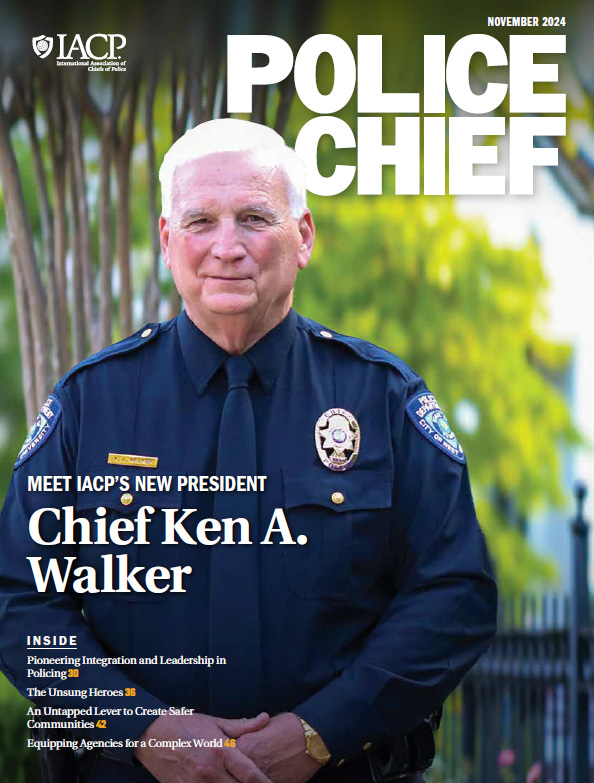Officer safety and wellness has always been the IACP’s top priority. It is the position of the organization that no injury to or death of a law enforcement professional is acceptable, which is why the IACP has developed the Center for Officer Safety and Wellness (the Center). The mission of the Center is to emphasize the values of safety, health, and wellness as they impact officer performance. The Center fosters the development of these values through educational materials, policies, training, tools, and other resources. The main objectives are to enhance the capacity of law enforcement leaders to instill a culture of safety and wellness in policing from recruitment through retirement and to create a framework that facilitates and advances officer safety and wellness practices.
There are some simple precautions law enforcement officers can take to enhance their safety and to make sure that they return home to their loved ones. Year after year, the number one cause of officer fatalities is traffic-related incidents. All too often, these horrific incidents could have been prevented by the use of a seat belt. The first thing an officer should do when he or she gets into a vehicle is to buckle up. Not only is it recommended, but it’s the law.
The seat belt, a simple but vital piece of safety equipment, is often neglected when officers are rushing to get to a scene. It is imperative that our law enforcement officers wear their seat belts and that chiefs stress the importance of seat belt use within their agencies.
Like seat belts, body armor is equally important to a police officer’s survival and well-being. Enacting a mandatory vest wear policy is only a preliminary step toward protecting officers from needless disabilities or deaths. Policy compliance must be institutionalized. Officer safety is an all-hands task, but it must originate from agency leadership. There’s no denying it, vests save lives, so make sure your officers wear their body armor at all times.
Not all police officer deaths are caused by on-the-job injuries. Last year, 13 percent of law enforcement officer fatalities were due to heart attacks. In comparison, 5 percent of law enforcement officers’ deaths were caused by heart attacks in 2012 and 7 percent in 2011. While it is impossible to foresee every medical issue, it’s important that officers and law enforcement agencies make efforts to prevent heart attacks before they happen. Preventative efforts include eating a heart healthy diet, exercising regularly, visiting a doctor regularly for blood pressure and cholesterol checks, limiting alcohol use, and not using tobacco products. Law enforcement agencies should encourage their officers to exercise, eat a healthy diet, and visit their doctors.
|
The IACP Center for Officer Safety and Wellness The Center strives to establish a culture of safety, health, and wellness by emphasizing these values as they impact officer performance from recruitment to retirement. Visit: |
Policing is a demanding, often stressful career. On a daily basis, officers are exposed to the worst humankind has to offer. Officers typically see more tragedy in the first few years of their careers than most people see in a lifetime: death, destruction, negative relationships, horrific crashes, and unspeakable crime scenes. The near-constant exposure to human suffering can take its toll on an officer.
While most academies prepare new officers to manage and prevent stress during training, the level of guidance and ongoing support available thereafter is varied. The mental health of law enforcement officers and the threat of suicide are critical concerns for police leaders and law enforcement agencies.
In police culture, suicide and mental health are often uncomfortable topics and can be seen as signs of weakness contrary to the strong, fearless image law enforcement officers are expected to project. As a result, many agencies and officers have nowhere to turn in a time of crisis. First-line supervisors are essential to the success of employee suicide reductions. Supervisors are the closest to the officers and need to provide support and encourage their officers to speak to them when suffering from a traumatic event.
Suicide knows no boundaries, and it strikes all levels of law enforcement. The IACP is committed to deploying a national strategic plan for implementation of state-of-the-art mental wellness and suicide prevention programs in police departments.
We must remember that although we as officers must be responsible for taking certain precautions ourselves, we must also look out for our peers. Officer safety requires support on all levels, from law enforcement executives to frontline officers. Executives need to lead by example and institute agency policies. All officers need to be aware of their fellow officers, encourage them to take precautionary measures from the use of safety equipment to healthy living, and make sure they know they have a support system and someone to talk to at all times. ♦
Please cite as:
Yousry “Yost” Zakhary, “Officer Safety Requires the Support of an Entire Agency,” President’s Message, The Police Chief 81 (May 2014): 6.


